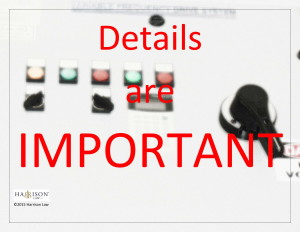One might wonder how a popular candy, a certain color, and a successful hard rock band are connected with an essential concept in contract law and often a key to business success. However, when you dig a little deeper, an important connection does exist.

The rock band at the center of this article is Van Halen. When they arrived on the music scene in the late 1970’s they were different than the trendy disco and punk rock bands of the time. Their musicianship and stage presence set them apart from their contemporaries, which led to album sales totaling almost one hundred million, high-grossing concert tours, and eventually the Rock & Roll Hall of Fame. Often cited is their famous concert rider.
In basic terms, a concert rider details the terms of the contract between the band and the local concert promoter. The rider contains the technical and personal specifications that the band requires to play at the specific venue. As an example, these riders contain information about construction of the stage, lights, and speakers to be utilized, down to the most basic of matters such as the food and personal amenities that are to be in provided in the backstage area. Because of their large arena-style concerts, Van Halen’s rider was extremely detailed as it outlined the important elements of staging, electrical, lighting, sound, and venue requirements. In fact, as a large production, Van Halen’s concert rider was over 200 pages long.
Van Halen placed within the multi-page rider a clause that required the concert promotor to supply several pounds of M&M’s to the band as part of backstage catering. However, all the brown colored M&M’s were required to be removed from the bowls. Failure to do so would allow the band to cancel the concert at the full expense of the concert promotor.
At first glance the “no brown M&M’s” requirement appears to be just another case of rock star excess and arrogance. However, this was not the situation. The clause served another purpose altogether and is a valuable lesson in drafting contracts. As discussed above, a concert production is a multi-million dollar endeavor requiring the coordination of hundreds of individuals and large amounts of equipment. If improperly set-up, a concert event could be delayed, experience technical problems and cost the band hundreds of thousands of dollars. In addition, an improperly constructed concert venue posed a health and safety concern for not only the band, but its crew, and concert goers as well. Almost every year there are stories of a stage collapsing and participants injured at a concert venue. Van Halen did not want this to happen at one of their events.
In order to guarantee that the concert promoter had read the entire contract in detail and had complied with its terms, the “no brown M&M’s” clause was inserted in the rider. It became the band’s warning flag. It demonstrated that if the concert promoter had not paid attention to the trivial detail concerning brown M&M’s that same promoter had usually not paid attention to the more essential parts of the rider. Whenever Van Halen first arrived at a venue, they would check the bowls of M&M’s for brown ones. If they were found (or no M&M’s were provided at all), the band would then conduct a complete line check and inspect every detail of the staging, lighting, electrical, safety and sound. In the process, they often found significant items that needed to be corrected. Van Halen drafted what appeared to be a very trivial contract clause that served a very important purpose. So important that it involved issues of health and safety for both the band and their fans.
I often repeat the mantra “the devil is in the details” when I present in front of business people or discuss contract matters with my clients. Being aware of the details of the contract is often the key to compliance. Complying with even the smallest detail provides you the best protection if a dispute arises. It is also the one party’s failure to comply with the details that commercial litigation attorneys (such as myself) use to their advantage.
On occasion, some business owners request a “simple” contract with “no boilerplate language.” I then need to remind them that simple is not always better—especially in written contracts where the court or arbitrator will only concentrate on the language on the contract and not what the other parties believe they agreed to. A business needs detail for protection.
Also, when my firm negotiates or assists in the drafting of various contracts, I often place and refer to certain terms and conditions as my “no brown M&M’s” clauses. These clauses often involve trivial information and requirements. However, the failure of a party to follow these basic terms is a big red flag that more important terms and conditions will not be complied with.
With this in mind, a business owner may want to review their contractual obligations to see whether their contracts already contain these “no brown M&M’s” type clauses. An evaluation whether the business is in full compliance before a dispute happens can prevent a lot of future issues. Also, an evaluation as to whether the other party is complying with the trivial terms may necessitate a more detailed review of compliance if they are not. Preventing a problem before it becomes a crisis is often the better approach.
As an end note and to show the potential long-term impact of these trivial clauses, Van Halen has been on tour this summer. Even though it is no longer in Van Halen’s rider, concert promotors will still leave a large bowl of M&M’s in the dressing room with all of the brown M&M’s removed. It remains a statement that the promotors still show that they have complied with all of the terms of their contract with Van Halen.
© 2015 Matthew W. Harrison and Harrison Law, PLLC All Rights Reserved
This website has been prepared by Harrison Law, PLLC. for informational purposes only and does not, and is not intended to, constitute legal advice. The information is not provided in the course of an attorney-client relationship and is not intended to substitute for legal advice from an attorney licensed in your jurisdiction.






